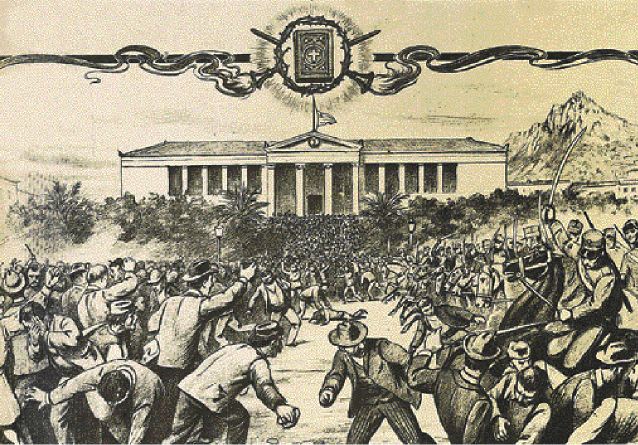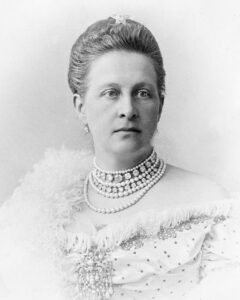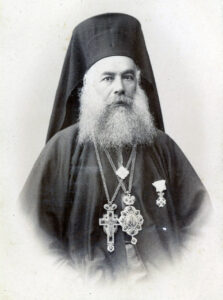At the end of the 19th century, the Russian-born Queen Olga of Greece commissioned her private secretary to translate the four Gospels into Modern Greek to make them more accessible to the ordinary laypeople. In December 1898, the secretary completed this project, and the Queen presented the translation to the Holy Synod of Greece for its approval. The Holy Synod stalled in replying, so the Queen organized a three-man committee – Metropolitan Procopius of Athens and two professors – to edit the translation. (Just a quick aside — the title of the holder of the See of Athens was “Metropolitan” until 1923, when it became “Archbishop.”)
At the end of March 1899, the Holy Synod responded: it could not approve of any translation into modern Greek, since the Orthodox Church “had never approved the translation of the Holy Scriptures into a vulgar and base language.” The Queen, undaunted, wrote back to the Synod in May, arguing that while the Ecumenical Patriarchate had indeed condemned Modern Greek translations of the Scriptures in 1836 and 1839, this was because the translations were being done by Protestants with the aim of undermining Orthodoxy. Surely a translation made by Orthodox Christians, commissioned by an Orthodox queen, could be blessed by a Holy Synod. The Holy Synod fired back a month later, refusing to budge on the matter. Queen Olga was not ready to surrender, though, and with at least the tacit permission of Metropolitan Procopius of Athens and the Greek government, she carried on with her efforts.
In February 1901, the Modern Greek translation of the Gospels that had been commissioned by Queen Olga was published. Between the queen’s initial back-and-forth with the Holy Synod about her translation in the winter of 1898-99 and the book’s publication in early 1901, many people had taken sides on the issue. Some saw the obvious need for a translation of the Scriptures that the ordinary Greek layperson could understand. Others viewed any translation as a distortion of the deep original meaning of the Biblical texts and a betrayal of the heritage of the Greek people. Some viewed Queen Olga with skepticism, as she was from Russia. She was supported by Metropolitan Procopius of Athens, himself a rather divisive figure. The battle played itself out in the newspapers, and would, later in 1901, move into the streets.
***
The controversy over the Modern Greek translation of the Gospels reached a new stage when, beginning in September, a progressive newspaper published a serialized translation of the Gospel of St Matthew by a lay translator of Homer’s Iliad. (This was separate from Queen Olga’s translation project.) In October, the Ecumenical Patriarchate sent a patriarchal encyclical to the Holy Synod of Greece, asking it to do whatever necessary to prevent the spread of this “most vulgar and degrading translation.” For its part, the Theological School at the University of Athens issued its own memorandum to the Holy Synod, expressing the same idea. On the other side, a second Greek newspaper joined the fray, publishing pro-translation articles that insulted the church hierarchy. The papers “were pouring oil on the fire in a manner approaching epilepsy,” as a contemporary observer, J.N. Psichari, put it. “They were publishing articles with such headings as ‘Burn them alive’!! Some mentioned that a ‘Saint Barthelemy’ was necessary [referring to the 1572 massacre of French Protestants by a Roman Catholic mob]. Frenzy, rage, foaming, hatred, abomination was the order of the day.”
At its next meeting on October 17 (Julian), the Greek Holy Synod duly condemned not only the serialized translation of St Matthew’s Gospel but any Biblical translation into Modern Greek. The Synod drafted an encyclical to this effect, but the encyclical wasn’t actually issued until November 7 – a critical delay of three weeks, during which period the situation spiraled out of control. The official explanation for the delay was that Metropolitan Procopius of Athens, the president of the Holy Synod, had to leave the meeting to take care of his sick mother and thus wasn’t present to sign the meeting minutes. Thus, the story goes, the Synod waited until Procopius returned to sign the minutes before it issued its statement. It seems more likely that Procopius disagreed with the Synod’s sweeping condemnation of all translations, which would have included Queen Olga’s.
On Monday, November 5 (Julian) – that is, when the Holy Synod still had not issued any public statement – a crowd of anti-translation students from the University of Athens descended upon the offices of the newspaper that had published the translation of St Matthew’s Gospel. The students chanted, “Down with the blasphemous; down with the sacrilegious!” After smashing some windows and burning copies of the newspaper, the mob moved on to another pro-translation newspaper office. In both cases, police prevented the students from doing any serious damage to the properties. Next the students marched to Metropolitan Procopius’s residence. The Metropolitan met them and claimed that he agreed with them and would “support their demand at the Synod.”
The following day the crowd had grown to a thousand people, both students and ordinary civilians, and they marched on the palace and unsuccessfully demanded to see the king. The university leadership attempted to quell the uprising, and students held an all-night sit-in at the university. The next day, November 7, the Holy Synod finally issued its statement condemning Modern Greek translations of the Bible. The encyclical was read out to the mob that had gathered at the University of Athens, and the crowd responded with chants of, “Excommunication! Excommunication! Excommunication!” in other words, demanding the excommunication of those responsible for the translations – including Queen Olga herself. The mob began marching toward the offices of the Holy Synod but were met by a joint police and military response. Some of the crowd threw objects at the troops. The cavalry rode into the crowd with their swords, and chaos ensued. Some in the crowd fired shots; three of the demonstrators were injured. Before things got completely out of hand, a torrential rain began to fall, and the day ended without further violence.
Meanwhile, adding fuel to the fire, Metropolitan Procopius had given a newspaper interview in which he opposed the excommunications of those who had translated the Gospels. On the afternoon of November 8, a crowd of roughly 10,000 people began to march in Athens. The government had ordered military reinforcements into the city, and the whole situation was a kind of powder keg. Amidst marching and speeches – with relatively minimal confrontations between demonstrators and soldiers – someone in the crowd shouted that they should visit Metropolitan Procopius. They ran into mounted troops and tried to break the line; some demonstrators fired their guns at the officers, who responded with gunfire of their own. Prime Minister Theotokis himself narrowly escaped being shot in the crossfire. The cavalry charged; the crowd scattered. Eight people died in the conflict.
***
In the aftermath, there was a lot of blame to go around. Theotokis blamed Metropolitan Procopius, who was forced to resign the throne of Athens (submitting his resignation, not to the Holy Synod, but to the government). On November 11, having lost the confidence of much of the Parliament, Theotokis himself resigned. The new government ordered the confiscation of all Modern Greek translations of the Bible. On November 25, clergy throughout the Church of Greece read out a new decree of the Holy Synod banning “on pain of excommunication” the sale or reading of any translation of the Gospels.
Main Sources
Philip Carabott, “Politics, Orthodoxy and the Language Question in Greece: The Gospel Riots of November 1901,” Journal of Mediterranean Studies 3:1 (1993).
Peter Mackridge, Language and National Identity in Greece, 1766-1976 (Oxford University Press, 2009).
J.N. Psichari, “The Gospel Riots in Greece” in The Language Question in Greece (Baptist Mission Press, 1902).



Very interesting. So when and how did it become acceptable to publish or read modern translations?
Yikes Orthodoxy, yikes…
THis is imperfect, and has notable omissions, but it is a valuable archive of news clips: https://sites.google.com/site/lakisvelotris/2cyusgknw.pdf
Keep in mind that in Greece at the time, there existed a “diglossa” between the simple “popular” (demotiki) everyday speech of most people and the artificially archaic “purified” (katharevousa) Greek, which was the official language of the government and the media. Unfortunately, the language issue became politicized, so the reaction to a modern Greek translation, which would have been viewed as a politically liberal policy, was quite strong and was seen not only as an attack on the Church but was also on Greece’s attempt to firmly cement itself as a heir of its ancient past. This was seen as important for Greece’s standing with the West, which at the time still held up Ancient Greek as a paragon of language.